How Do Grocery Stores Make Ground Beef
The Surprising Truth Of Your Grocery Store'south Butcher Counter
A well-stocked butcher counter is a meat-loving cook's paradise, full of endless possibilities. Restaurant-quality steaks, marbled rib roasts, free-range craven — information technology's all there at your fingertips, ready to plough into the meal of your dreams. And since y'all're ownership fresh meat, poultry, and seafood, you assume you lot're getting the best of the best. Unfortunately, if you lot dig a little deeper y'all might detect some unsavory truths hiding backside that glass case.
But don't worry — it's non all bad. One time you get past the pesky poop-in-the-ground-beef situation, there are tips and tricks that can save you time and money (assuming you lot haven't decided to become a vegetarian in the wake of all your new-found knowledge). Even though some of these tidbits might be hard to swallow, here'south what you demand to know about the grocery store butcher counter.
There's probably poop in your footing beef
Thanks to a Consumer Reports investigation, we now know that just most all ground beef "contains leaner that signifies fecal contamination." That's correct, folks — poop. Of the 458 pounds of basis beefiness tested, not one exam came back sans poop. And yes, sad, that includes organic, grass-fed varieties. The introduction of the bacteria comes from the slaughtering procedure, where fecal matter tin make its way from other parts of the cow to the carcass. This becomes an event with ground beef (versus larger cuts of beef) because the bacteria gets incorporated throughout the meat, making it harder to cook to a high enough temperature to impale what might be lurking in the middle. And then while a juicy rare burger might exist your go-to social club, y'all're likely getting a footling more you bargained for — and information technology's probably non the hole-and-corner ingredient you lot were hoping to uncover.
And there's poop in your ground turkey
Because Consumer Reports patently likes to nuance all of our ground meat dreams, they've likewise got bad news near ground turkey. That's correct — there'south probably poop in your ground turkey, too. In their analysis, more than half the packages tested positive for fecal bacteria. But that's better than 100 percent (ahem, ground beef!), right?
That vivid carmine beefiness may not be every bit fresh as you think
Packages of meat are often treated with carbon monoxide, which is used as a color stabilizer, to give beef that bright red, juicy appearance. Considering this treatment tin can affect the meat for several weeks, the color should non exist used as an indicator of freshness alone. Go by the sell-by date on the package (though yous're almost to acquire some bad news about that, likewise), and trust your nose. A spoiled steak will aroma horrible, even if information technology is brilliant red.
Expiration dates might non mean anything
One of the all-time places to score a bargain is the "manager'southward special" section at the butcher counter. Only it turns out that those half-price packages expiring "today" might really mean "yesterday" or "terminal calendar week." Considering grocery stores often package their ain meat, they're in command of the sell-past dates, and if they think a steak is nevertheless sellable subsequently its engagement, they can give it a new one, but like that. Again, your nose is your friend when it comes to meat.
Butchers can exist shady
Co-ordinate to one Redditor, who claims to be a butcher in a grocery store, at that place might be some shady practices going on in the meat department, and almost of them will result in you spending more coin. Here's what to watch for: "Stores will do everything from grinding water ice in with the beef (to pump upwards the weight), try to put actress stuff on the scale, weigh the meat later on information technology's packaged, or sell one cut of beefiness as something better." The moral of the story? Be extra prissy to your butcher.
The meat might be misted with Windex
One Chowhound user has sworn off meat from their grocery store butcher counter for one reason: Windex. In this butcher counter horror story, the affiche claims to have watched an employee lift the meat case open from the front end and spray the inside of the glass with Windex, finer misting all the fresh meat at the same time. Now whether or not a lite sprinkle of Windex on your steak will do you harm is beside the point — I think we tin can all agree that we'd prefer our meat exist free of blueish cleaning solution.
"Angus" doesn't necessarily mean "better"
If you're making a beeline for the Angus beef because you call back it's better quality, think again. The term "angus" has naught to practice with the grade of the meat — information technology's actually the breed of cow. To ensure that you're getting top quality beef, look for the USDA shield instead. This label indicates the meat grade of "prime," "choice," or "select." When you actually want the good stuff, get for the prime.
You might be paying a lot more than for the "fresh" seafood
Though you call up yous're buying fresh seafood at the butcher counter, it is ordinarily previously frozen and defrosted (pay attending to the labels!). According to Phil Lempert, grocery industry expert, you tin can usually buy the same seafood in the frozen section for upwardly to forty per centum less.
A whole lot of fish is mislabeled
Fish fraud is rampant nationwide. According to a study from ocean conservation advocacy organization Oceana, "seafood may be mislabeled as oftentimes as 26 to 87 percent of the time for commonly swapped fish such as grouper, cod and snapper, disguising fish that are less desirable, cheaper or more than readily available." The study, which included grocery stores, shows the importance of request questions and learning where your seafood is coming from. Some stores are now providing traceability, meaning they know exactly how the fish got from gunkhole to butcher counter. I of the easiest means to tell if your fish is fake? The price. If the fish is one-half the toll of what information technology unremarkably is, there'due south probably a reason.
There's a hugger-mugger to getting cheap filet mignon
If you're craving a filet mignon merely the price tag is property you back, buy a T-bone steak instead. On one side of the os is a perfectly succulent New York strip, and on the other side is a filet. You lot'll salve upward to $5 a pound with this butcher counter hack.
The butcher will do a lot for you
Another way to salve some money on your grocery bill: purchase larger cuts of meat and whole chickens, and so enquire the butcher to break information technology downward for you. Often times the cost per pound is much cheaper than buying meat that has already been processed.
You can as well ask your butcher to debone or grind meat and tie up roasts. Some stores volition even flavor meat and poultry with rubs. All you accept to do is enquire.
The chicken could brand y'all sick
Later a staggering 25 percentage of chicken pieces were plant to have salmonella bacteria, sickening an estimated one 1000000 people a year, the USDA has imposed new prophylactic measures to reduce the leaner in poultry. The new guidelines aim to reduce illnesses by thirty percent, which means there is nonetheless enough of salmonella floating around out there. The best way to guard confronting the bacteria is to ensure chicken is cooked to an internal temperature of 165 degrees.
Your steaks might be mechanically tenderized
To make steaks more than tender, raw beef is frequently run through a machine which pierces the meat with tiny needles. This process is called mechanical tenderization, and it is not required to be disclosed on the packaging. The problem with this process is that the needles can force bacteria inside the meat, and if you're a rare steak lover, this could pose a problem. Typically, whatever bacteria present on the meat surface volition get killed in the cooking process, only if the internal temperature doesn't get loftier enough, any leaner introduced in the tenderizing process could remain. You can't tell if meat has been mechanically tenderized by looking at it, so ask your butcher if y'all intend to take a bloody steak for dinner.
Source: https://www.mashed.com/102403/surprising-truth-grocery-stores-butcher-counter/
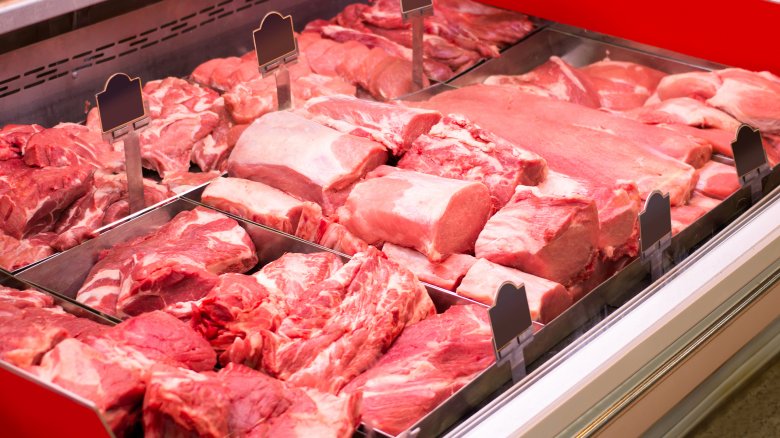
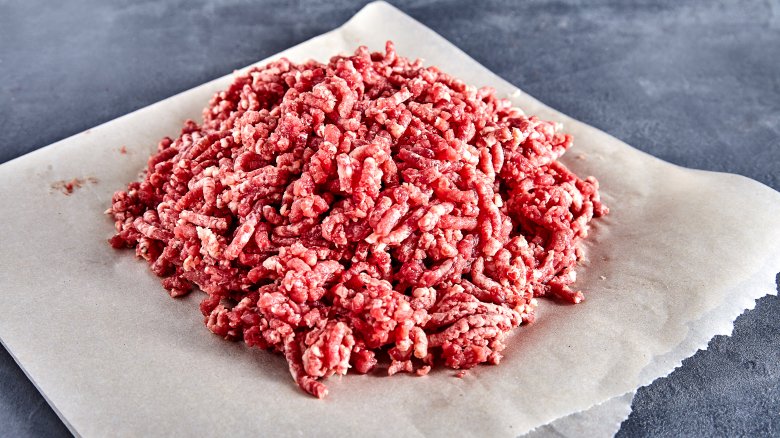
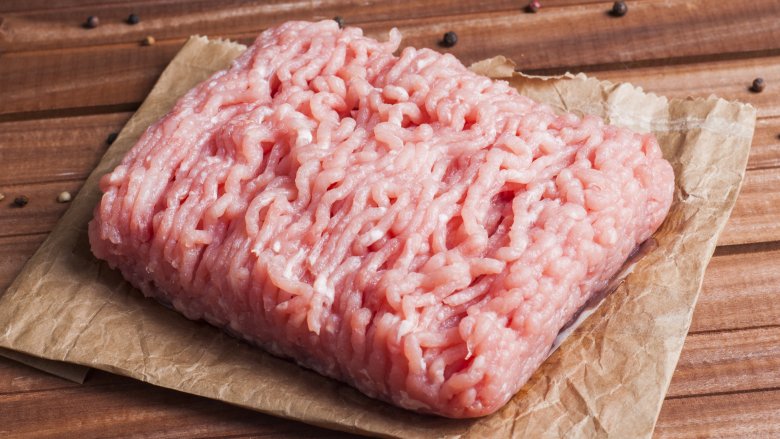
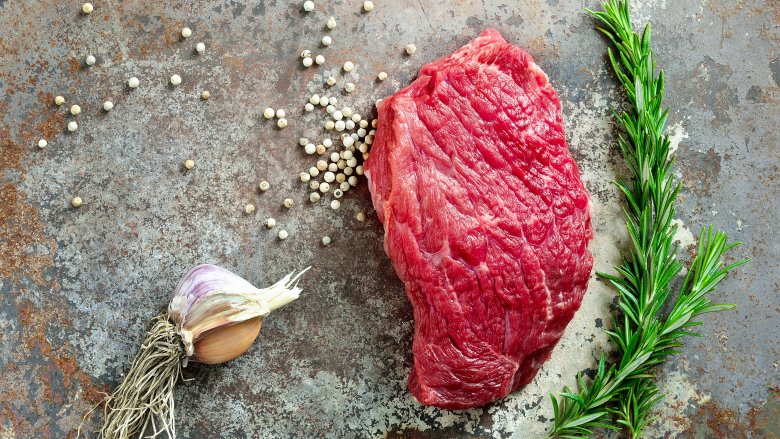
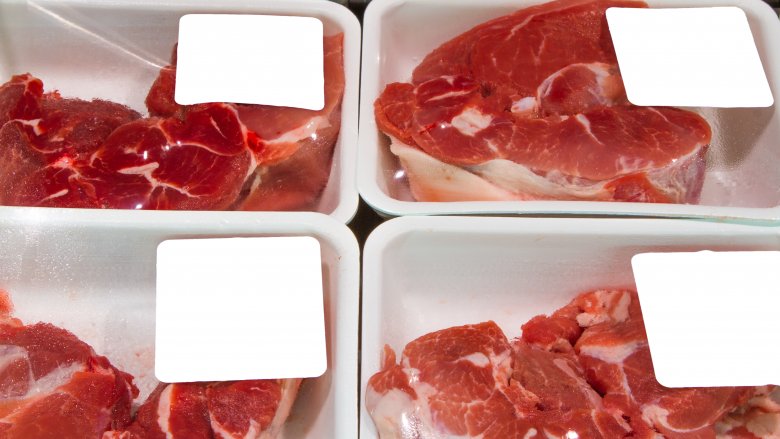
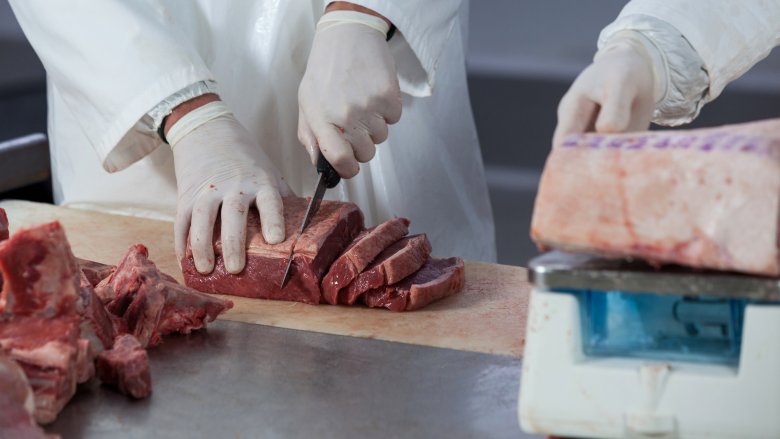
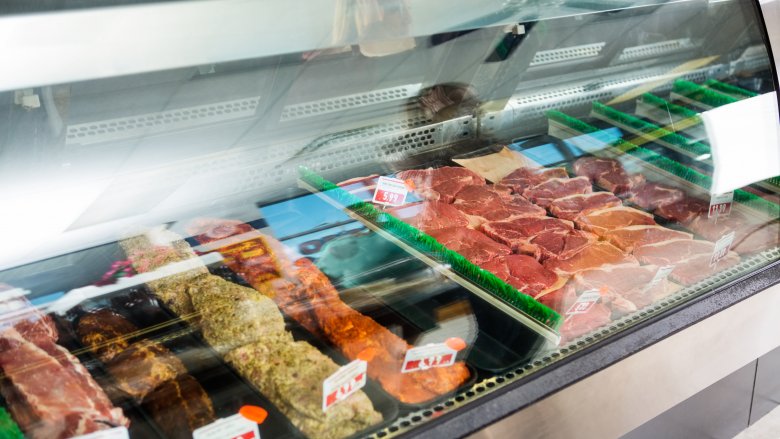
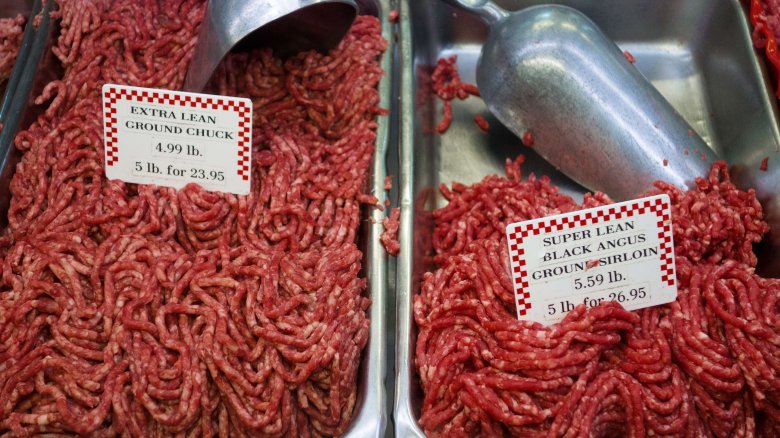


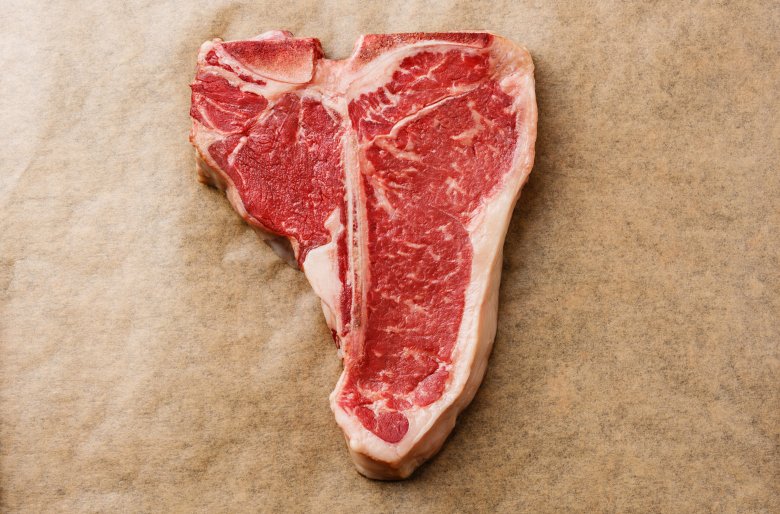
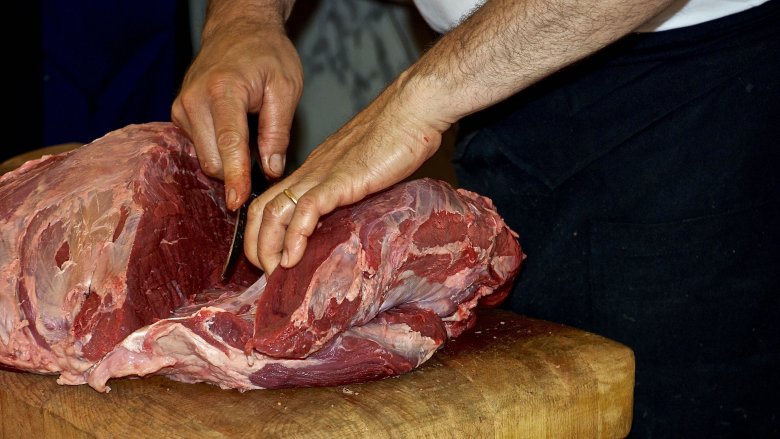
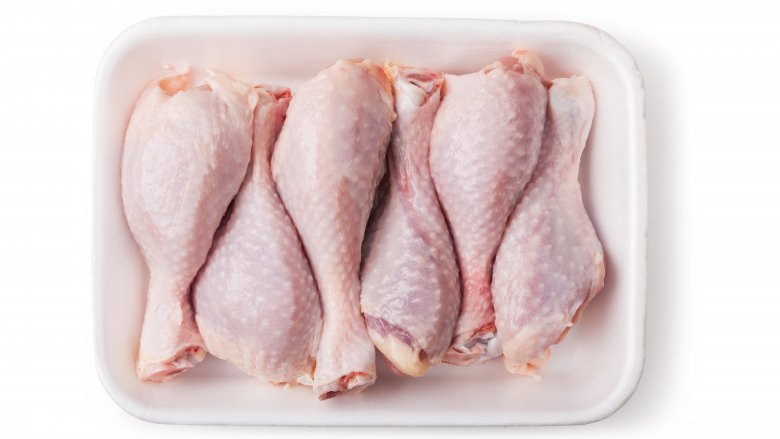
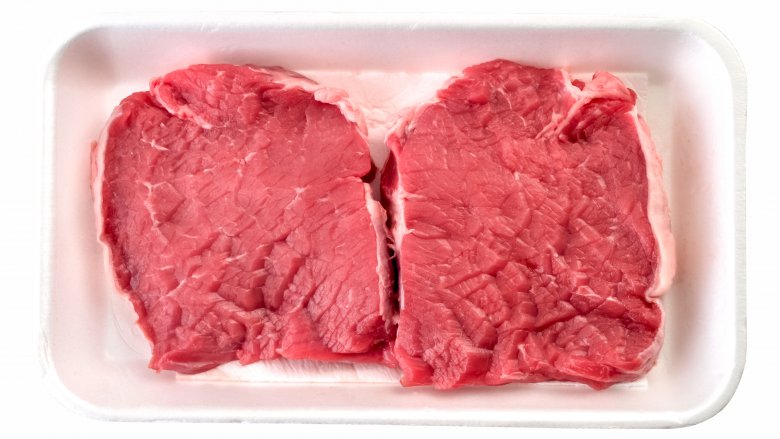
0 Response to "How Do Grocery Stores Make Ground Beef"
Post a Comment